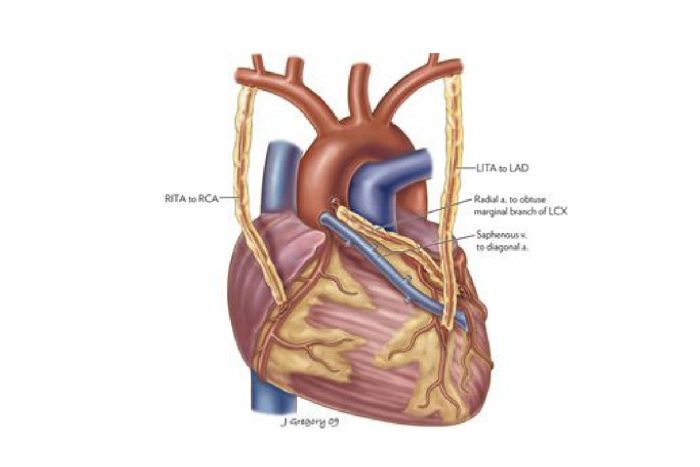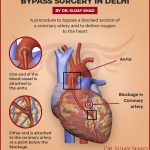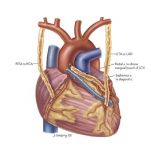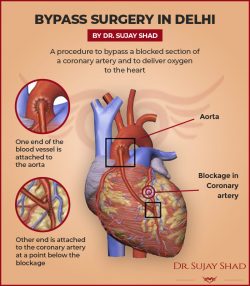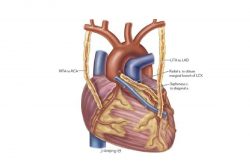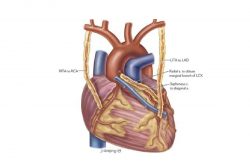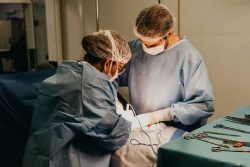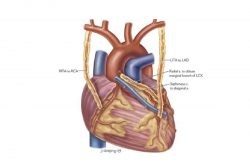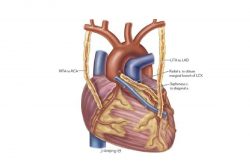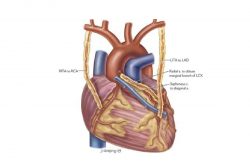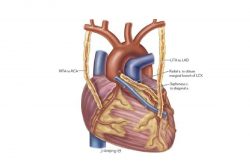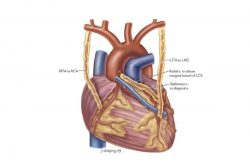Indications for a Bypass Surgery
Coronary artery bypass surgery, also known as heart bypass surgery, is a procedure used to reestablish blood flow to particular parts of the heart. Artery blockages can cut off the blood’s flow and lead to other problems, such as a heart attack. A CABG surgery helps to restore blood flow and makes use of blood vessels from other parts of the body to create a detour around blockages.
To provide readers with a better understanding of the indications for bypass surgery, Dr. Sujay Shad, a leading heart surgeon, has explained the same in this blog. He has also shed light on the factors that determine bypass surgery cost in Delhi. Continue reading for more insights.
Why is Coronary Bypass Surgery Done?
The heart works 24/7 and is responsible for supplying the entire body with blood. To do its job, the heart requires blood flow, which it acquires through a network of supply arteries that wrap around it. When the tissues in the body do not get enough blood flow, they cause a problem known as ischemia. By restoring blood flow to the affected heart muscle, coronary bypass surgery also helps in the treatment of ischemia. The surgery can also be performed as an emergency treatment for a heart attack if other treatments do not work.
A heart surgeon would recommend coronary bypass surgery if one has the following:
- A blockage in the left heart artery. This artery is responsible for supplying blood to the heart muscles.
- Narrowing of the main heart artery.
- Having severe chest pain that is caused by the narrowing of various heart arteries. The narrowing reduces the blood flow to the heart when performing light exercises or even at rest.
- Having more than one diseased heart artery and if the lower left heart chamber does not work correctly.
- Having a blocked heart artery that is difficult to treat with coronary angioplasty. This is a less invasive treatment that uses a balloon on the tip of a thin tube, known as a catheter, to widen the artery. Afterwards, a stent is used to keep the artery open.
- An angioplasty with a stent has not worked. For example, an artery that got narrowed again after a stenting.
What Conditions Can be Treated by a Coronary Bypass Surgery?
The condition that is most likely to lead to coronary bypass surgery is coronary heart disease. The conditions included under coronary heart disease include angina pectoris, which indicates chest pain caused by ischemia in the heart, and silent myocardial ischemia, which is heart ischemia without showing any symptoms.
Conditions that fall under coronary heart disease involve a narrowing of the arteries in the heart due to plaque (a buildup of fatty wax-life residue). If the plaque builds up inside the heart’s arteries, the arteries become stiffer and narrower.
When an area of plaque opens up, blood clots can form and cause blockages in the arteries. Ischemia in sections of the heart is caused by these obstructions, which can lead to a heart attack.
Conclusion
There are a range of factors that determine the cost of bypass surgery. These include the patient’s condition, aftercare and follow-ups, technology, the scope of the operation, the experience of the surgeon, and many more.
If one is interested in knowing more about coronary bypass surgery, one can book a consultation with Dr. Sujay Shad, a heart surgery doctor in India, at the renowned Sir Ganga Ram Hospital. Book an appointment today!
